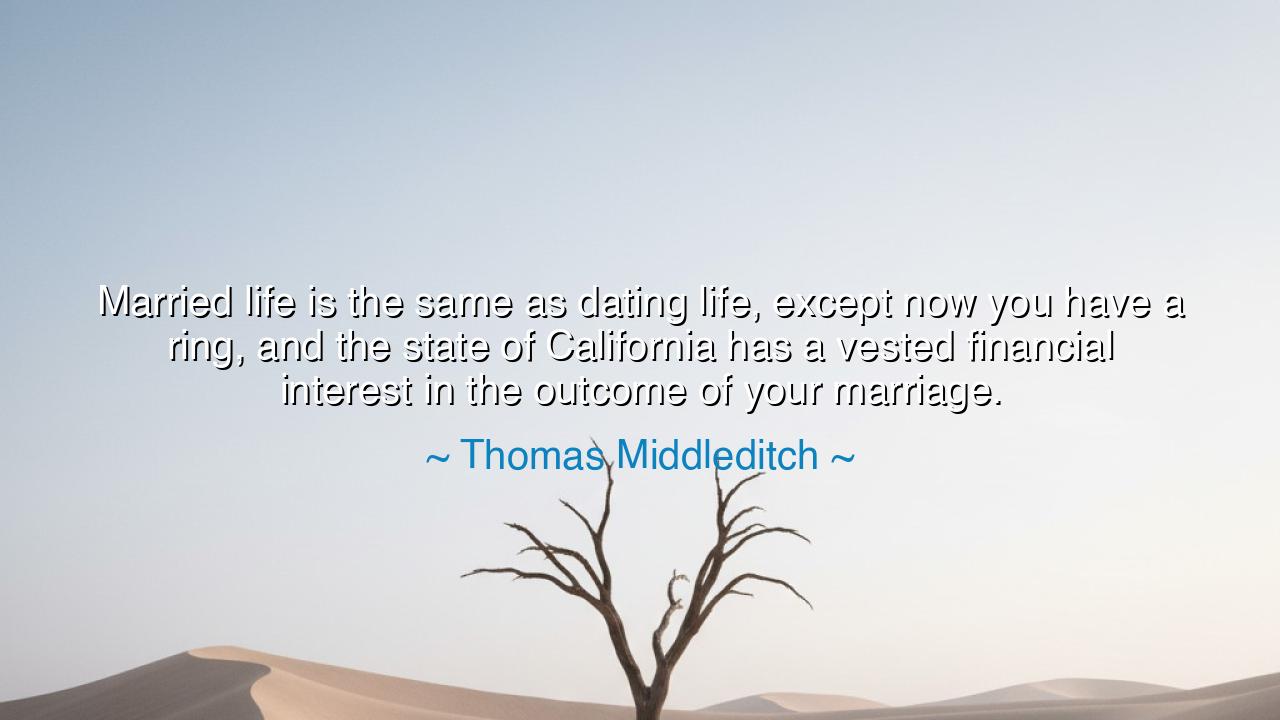
Married life is the same as dating life, except now you have a
Married life is the same as dating life, except now you have a ring, and the state of California has a vested financial interest in the outcome of your marriage.






In the words of Thomas Middleditch, we encounter both jest and judgment: “Married life is the same as dating life, except now you have a ring, and the state of California has a vested financial interest in the outcome of your marriage.” It is a sentence wrapped in humor, but its heart beats with truth. Beneath the laughter lies the ancient question — what is love, and what becomes of it when it meets the machinery of law and society? Middleditch speaks as the philosophers once did, with irony as his blade, carving away illusion to reveal a harder, brighter core. His words remind us that even sacred unions, once bound by affection alone, can become entangled with the worldly threads of power, property, and consequence.
In the days of our ancestors, marriage was not always the union of hearts but the alliance of families, wealth, and legacy. Kings wed to seal peace; merchants wed to secure fortune; peasants wed to survive the hunger of the world. And yet, even among them, the poets whispered that love was something higher — something untouched by contract or coin. The poet Sappho, writing on her island of Lesbos, sang not of law or lineage but of desire itself — wild, divine, and dangerous. Middleditch’s words echo this ancient tension: the eternal struggle between romantic idealism and earthly realism. What begins as love between two souls is soon witnessed by courts, governed by laws, and measured in signatures and settlements.
When he says, “now you have a ring,” Middleditch calls forth the symbol that has endured through ages — the ring, that eternal circle with neither beginning nor end. Yet even this holy symbol, meant to represent unending devotion, has become a mark of transaction in the eyes of the state. The ring binds, yes, but it also marks one as bound — not only to the beloved, but to the system that oversees their bond. It is here that humor sharpens into wisdom. The laughter hides the lament: that even the purest emotion is not immune to the weight of bureaucracy, the shadow of ownership, and the hands of those who profit from human vows.
Consider the tale of Henry VIII, king of England, whose passion for love clashed with the authority of Rome. When he sought to dissolve his marriage, he found himself not only at odds with his wife but with an entire church. His desire for personal freedom shattered the unity of faith and birthed a new religious order. In his story, we see Middleditch’s point cast in grand historical light: the moment love and legal power collide, the earth itself trembles. Love, it seems, is not only a private affair but a matter of politics, power, and control — an empire within an empire.
But there is also humor’s mercy in the quote — the recognition that this absurdity is part of the human condition. Middleditch invites us to laugh, for laughter is the balm of wisdom. He reminds us that while the world may drape love in laws, the essence of connection remains the same. Whether one wears a ring or not, the daily rituals of companionship — the patience, the vulnerability, the choosing of each other again and again — remain the same. The legal contract does not make love; it merely witnesses it. The true covenant, invisible and eternal, is written not in ink but in the actions of the heart.
Thus, the teaching emerges: do not mistake the form of love for its substance. Rings, ceremonies, and documents may honor a bond, but they cannot sustain it. Nor can the state dictate affection, forgiveness, or joy. These are spiritual labors, carried out in private sanctuaries where law has no reach. If the state has “a vested interest,” then let the soul have one too — an interest in truth, growth, and shared freedom. For only love freely chosen, and daily renewed, can withstand both the mockery and the weight of the world.
And so, let this quote be a mirror and a warning. Laugh with Middleditch, but listen as well. Remember that commitment is sacred, but only when born from self-awareness, not social expectation. Cherish the bond, but guard your individuality within it. If you wed, wed with open eyes — not only to the person beside you, but to the forces that will seek to shape your union. And above all, remember this: the heart’s contract is older than any state, deeper than any law, and truer than any ring. To honor that is to live with both wisdom and freedom.






AAdministratorAdministrator
Welcome, honored guests. Please leave a comment, we will respond soon